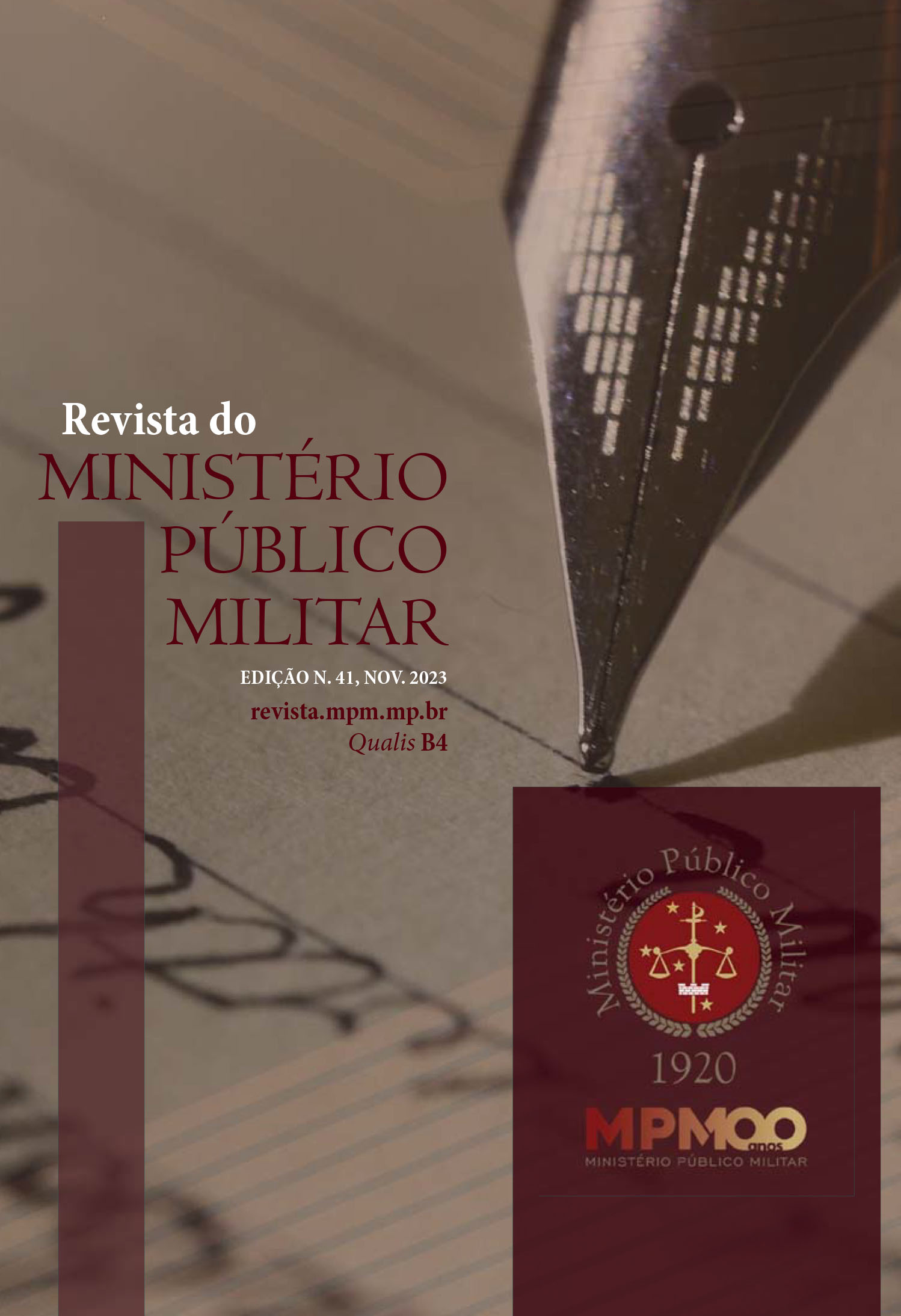Challenges to updating Military Law: case study of Article 166 of the Military Penal Code
Keywords:
militar law, fundamental rights, hierarchy and discipline, Law No. 14,688/2023Abstract
This article analyzes, from its emergence in the national order, the basic concepts and foundations of Military Law, as well as addresses the reasons for the need to update its content. It highlights the constitutional principles of hierarchy and discipline and their interaction with the fundamental rights of the military, specifically, related to the vicissitudes of freedom of expression and special relations of subjection. Furthermore, it promotes a case study on the legislative process of Law No. 14,688, of September 20, 2023, focusing on the rule of Art. 166 of the CPM, Publication or undue criticism. The methodology adopted was bibliographical research and analysis of legislation and jurisprudence, using the deductive method. It was concluded that the legislative update promoted by Law 14,688/2023 could have taken advantage of the opportunity to bring military legislation closer, with regard to the norm of Art. 166 of the military penal code, to the current constitutional axiomatic dictates; and that the special relations of subjection (submission and restriction of rights) of the military before the State are justified in favor of institutional security, as well as the strengthening and preservation of the premises of hierarchy and discipline within the scope of Military Law, aiming to guarantee peace Social.
References
ASSIS, J. Curso de Direito Disciplinar Militar – Da Simples Transgressão ao Processo Administrativo. Curitiba: Juruá, 2007.
BRASIL. [Constituição (1988)]. Constituição da República Federativa do Brasil de 1988. Brasília, DF: Presidência da República, [2016]. Disponível em: http://www.planalto.gov.br/ccivil_03/Constituicao/ Constituiçao.htm. Acesso em: 10 set. 2023.
BRASIL. Decreto-Lei nº 10.001, de 21 de outubro de 1969. Institui o Código Penal Militar. Diário Oficial da União – Seção 1 – 21/10/1969, Página 8940 (Publicação Original), Brasília, DF, 21 out. 1969.
BRASIL. Decreto nº 678, de 6 de novembro de 1992. Promulga a Convenção Americana sobre Direitos Humanos (Pacto de São José da Costa Rica), de 22 de novembro de 1969. Disponível em: https://www.planalto.gov.br/ccivil_03/decreto/d0678.htm. Acesso em: 23 set. 2023.
BRASIL. Supremo Tribunal Federal (Plenário). Arguição de descumprimento de preceito fundamental 475 DF. Artigo 166 do Decreto-Lei nº 1.001, de 21 de outubro de 1969. Código Penal Militar. Improcedência do pedido. Requerente: Partido Social Liberal. Relator: Min. Dias Toffoli, 29 de novembro de 2005. Disponível em: https://redir.stf.jus.br/paginadorpub/paginador.jsp?docTP=TP&docID=76736226. Acesso em: 25 set. 2023.
ENTERRIA, E. G. Curso de Derecho Administrativo. Reimpresión. Tomo II. Madrid: Edit Civitas, 2001
GUSMÃO, P. D. Introdução ao Estudo do Direito. 40. ed. Rio de Janeiro: Forense, 2008.
MELLO, C. Forças Militares no Brasil Colonial Corpos de Auxiliares e de Ordenanças na Segunda Metade do Século XVIII. Rio de Janeiro: E-papers, 2009.
PENAGOS, G. Fundamentos del Derechos Administrativo. Ediciones Librería del Profesional. Primera edición, 1993.
SENADO FEDERAL. Codigo Philippino, ou, Ordenações e leis do Reino de Portugal: recopiladas por mandado d'El-Rey D. Philippe I. (1870). Disponível em: https://www2.senado.leg.br/bdsf/item/id/242733. Acesso em: 20 set. 2023.
SOARES, R.H.S. A discricionariedade nas decisões administrativas: análise crítica dos poderes sancionatórios do Exército Brasileiro sobre seus agentes. Tese (Doutorado em Direito) – UNMDP. Mar Del Plata. Argentina. 2023.
SOARES, R. H. S. Reflexões acerca da liberdade de expressão e das restrições às manifestações nas redes sociais e meios digitais. Direito Militar, v. 1, p. 13-18, 2019.
ZAFFARONI, Raúl Eugenio; BATISTA, Nilo. Direito Penal Brasileiro, 1. ed. Rio de Janeiro: Revan, 2003.

Downloads
Published
How to Cite
Issue
Section
License
Copyright (c) 2023 Revista do Ministério Público Militar

This work is licensed under a Creative Commons Attribution 4.0 International License.

Este trabalho está licenciado com uma Licença Creative Commons – Atribuição 4.0 Internacional.
